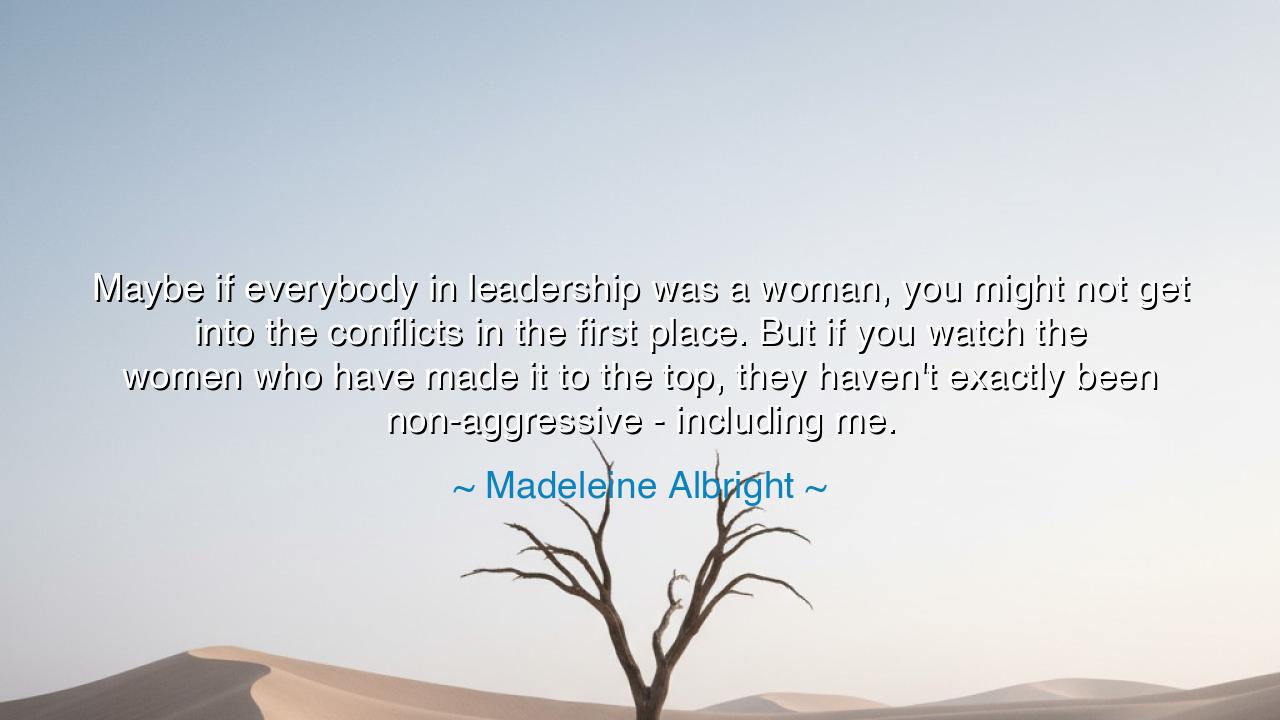
Maybe if everybody in leadership was a woman, you might not get
Maybe if everybody in leadership was a woman, you might not get into the conflicts in the first place. But if you watch the women who have made it to the top, they haven't exactly been non-aggressive - including me.






In the fierce yet thoughtful words of Madeleine Albright, the first woman to serve as U.S. Secretary of State, we find a meditation on the paradox of power, gender, and leadership. She declared: “Maybe if everybody in leadership was a woman, you might not get into the conflicts in the first place. But if you watch the women who have made it to the top, they haven’t exactly been non-aggressive — including me.” This is not a boast, nor is it a lament. It is the measured voice of a leader who has walked through the fires of history, bearing the dual burden of being both a woman and a warrior.
In these words lies a profound truth about the nature of leadership itself. Albright, having risen through the hardened structures of global politics, speaks to the delicate balance between compassion and strength, empathy and resolve. She reminds us that feminine leadership does not mean weakness, nor is it the absence of conflict, but rather the presence of conscience amid the clash of powers. The ancients would have said that the gods favor balance—that Athena, goddess of wisdom and war, was no less fierce because she was just, and no less just because she was fierce.
When Albright says that if “everybody in leadership was a woman” there might be fewer conflicts, she is not imagining a utopia of gentleness alone, but a transformation of values. For centuries, the world has been governed by the thunder of pride, by the aggression of men who mistake domination for order. She offers a vision where leadership might instead spring from understanding, where decisions are measured not by ego but by empathy. Yet she does not deny that women, too, when called to lead, must wield strength, even aggression, to be heard and to survive in a realm forged by steel.
Consider the example of Queen Elizabeth I, who ruled England in a time when women were seen as too frail for thrones or battlefields. She called herself the “lion’s heart in a woman’s body.” Her reign saw both diplomacy and war, peace and preparation. She understood, as Albright did, that the path of a woman in power is one of dual mastery — the ability to extend mercy with one hand and wield a sword with the other. The world demands both tenderness and thunder, and true leadership is the art of knowing when to summon each.
Albright’s confession — that women who rise to the top “haven’t exactly been non-aggressive” — is both an admission and an anthem. It reveals that in the climb toward influence, ambition and assertiveness are not sins but survival. Yet, unlike the ruthless ambition of the conqueror, hers is an aggression born of purpose — the flame that refuses to be extinguished by doubt or dismissal. The ancients would have called this righteous zeal, the fire of the spirit that burns not for vanity but for vision.
Let the listener understand: true leadership is not bound to gender, but it is shaped by experience. The woman in power carries with her the memory of struggle, the echo of voices silenced before her, the instinct to protect even as she commands. Her aggression, when rightly tempered, is not the aggression of destruction, but of determination — the will to create a world where justice and compassion may coexist.
So let this be the lesson for all who would lead: whether man or woman, let your strength be guided by wisdom, and your courage be softened by empathy. Do not fear aggression when it is the handmaiden of righteousness, nor mistake gentleness for weakness. The wise leader is both serpent and dove — fierce in purpose, but pure in heart.
And to those who walk in Albright’s shadow — those who seek to rise where few have stood — remember this: the measure of your leadership lies not in how loudly you command, but in how deeply you care. Be bold. Be unafraid to fight when peace demands it. But let every act of power serve the greater good, that one day, the world may know not the rule of the strongest, but the reign of the wise.






AAdministratorAdministrator
Welcome, honored guests. Please leave a comment, we will respond soon